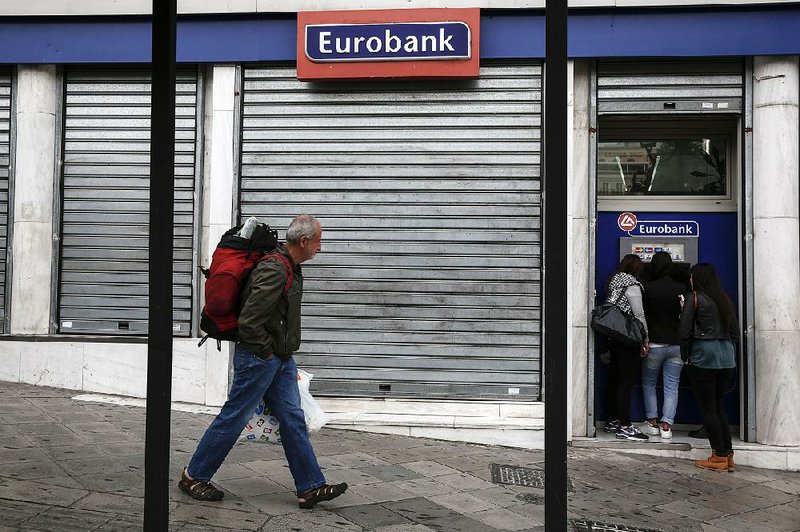ATHENS, Greece -- Greece's four main banks must raise 14.4 billion euros in fresh capital, the European Central Bank said, as investors and taxpayers face the cost of repairing the damage from six months of wrangling between the nation's government and its creditors.
The review is an important step toward ending limits on bank customer withdrawals and transfers that continue to hamper businesses as the Greek economy struggles to recover.
An asset-quality review carried out by the central bank resulted in valuation adjustments of 9.2 billion euros for the National Bank of Greece SA, Piraeus Bank SA, Eurobank Ergasias SA and Alpha Bank AE, the Frankfurt-based supervisor said Saturday in a statement. At current exchange rates, 1 euro is equal to about $1.10.
The banks' capital gap amounted to 14.4 billion euros under a simulated stress-test scenario and 4.4 billion euros under baseline macroeconomic assumptions. The four banks will have to submit recapitalization plans to the central bank's supervisory arm by Friday.
National Bank of Greece, the country's biggest bank by assets, has a total capital shortfall of 4.6 billion euros, including 1.6 billion from the baseline scenario.
Piraeus has the biggest shortfall of all the lenders and needs to raise 2.2 billion euros under the baseline scenario and 4.9 billion euros in total.
Alpha Bank only needs to raise 263 million euros under the baseline scenario, out of a total shortfall of 2.7 billion euros.
Eurobank has the lowest aggregate shortfall, totaling 2.2 billion euros, with 339 million euros corresponding to the baseline scenario.
The European Commission said in a statement that it is "encouraged" by the results, while Eurobank's Chief Executive Officer Fokion Karavias said that the lender's capital needs under the stress test's adverse scenario are "fully manageable."
The government of Prime Minister Alexis Tsipras and Greece's European creditors reached a bailout agreement this summer after months of wrangling that brought the country to the brink of leaving the currency union and resulted in capital controls. Recapitalizing the country's lenders, after a monthlong forced shutdown in July and record deposit bleeding, is the first step to restart the country's economy, which is still crippled by restrictions on transfers of capital and ATM withdrawals.
Lenders will ask their shareholders and bondholders to voluntarily offer to plug any holes identified by the central bank before resorting to a 25 billion-euro state backstop, according to a bank recapitalization bill that the Greek Parliament approved Saturday. Taxpayer funds will come from euro-area emergency loans under Greece's latest bailout agreement.
Common and preferred stock, as well as other financing instruments including unsecured senior liabilities, can be bailed in before a financial institution is eligible to use the public backstop, according to the bill. Eurobank, Alpha Bank and Piraeus have already extended swap offers to their bondholders as they seek to reduce liabilities and boost their capital.
A spokesman for the European Stability Mechanism -- the currency union's crisis loans fund -- said Greece can "quickly" use 10 billion euros, which have been mobilized for Greek bank recapitalizations and are currently sitting in a segregated account.
With sufficient private-sector participation, the remaining 15 billion euros that have been earmarked for capital injections under the terms of the bailout will not be needed, the spokesman added, asking not to be named in line with policy. This will also mean that Greece may not use the full bailout of more than 85 billion euros envisaged in July.
The new recapitalization legislation also empowers the state-owned Hellenic Financial Stability Fund to regularly evaluate the management and boards of Greek lenders that seek state aid.
Greece is racing to bail out the banks before year's end, when new European bank bailout rules take effect that would require seizing deposits over the 100,000-euro limit on deposit insurance. That would sting big depositors such as small- and medium-size businesses.
Deputy Prime Minister Yiannis Dragasakis said passage of the bill would avert seizure of deposits.
Greek Finance Minister Euclid Tsakalotos said that bank recapitalization and a viable solution to nonperforming loans will both happen before the end of the year.
Tsakalotos told Parliament that the country's Financial Stabilization Fund will obtain common bank shares, with voting rights.
"We would like to influence the banks' policies, so that they do not invest in high-risk instruments. We do not want to influence top management appointments or to whom they should provide loans," he said.
Information for this article was contributed by Nikos Chrysoloras, Christos Ziotis, Alessandro Speciale Arne Delfs, Tino Andresen, Rebecca Christie, Andrew Mayeda, Paul Tugwell, Marcus Bensasson and James G. Neuger of Bloomberg News; and by David McHugh and Demetris Nellas of The Associated Press.
A Section on 11/01/2015
